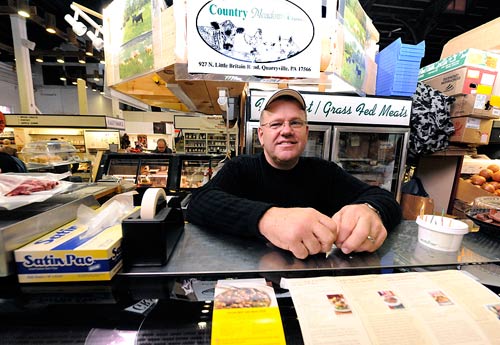 Picture Lancaster County in your mind’s eye. Here are cows, Amish folk driving horse carriages, rolling bucolic farmland and plain clothing flapping on a line.
Picture Lancaster County in your mind’s eye. Here are cows, Amish folk driving horse carriages, rolling bucolic farmland and plain clothing flapping on a line.
The hole in the center of the picture is the 7.4 square-mile City of Lancaster, home to just over 55,000 people, and the eighth largest city in Pennsylvania. Here, buggies are supplanted by SUVs, and the flapping is done by pigeons alighting on the Soldiers and Sailors Monument in Penn Square. Although the advertising cards found in every hotel and outlet mall suggest that the locals subsist entirely on all-you-can-eat smorgasbords, the small city now boasts a diversity of restaurants serving progressive and classic cuisine fashioned from the local harvest, inexpensive ethnic foods, and a burgeoning craft brewing scene.
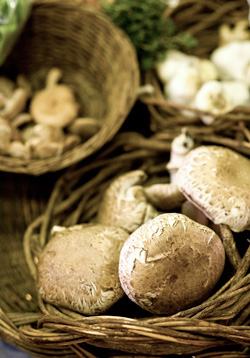 At the center of town, just off Penn Square, is the oldest continuously operating farmer’s market in America. The Central Market dates back to 1757, and now houses 60 merchants selling familiar local specialties like scrapple and headcheese, as well as newer merchants offering ethnic prepared foods. Rafiki’s Deli invites shoppers to taste authentic African fare, like four-grain salad, chickpea salad and veggie curry with yogurt sauce, providing local vegetarians more options than grilled cheese. Saif’s Middle Eastern Foods, The German Deli and The Blue Bandanna Gluten-Free Bakery offer a diversity of flavors and dietary accommodations for lunch in the market. Culton Organics’ stand overflows with seasonal, chemical-free produce, and Country Meadows Farms sells only locally raised, grass-fed meat, free from GMOs and antibiotics.
At the center of town, just off Penn Square, is the oldest continuously operating farmer’s market in America. The Central Market dates back to 1757, and now houses 60 merchants selling familiar local specialties like scrapple and headcheese, as well as newer merchants offering ethnic prepared foods. Rafiki’s Deli invites shoppers to taste authentic African fare, like four-grain salad, chickpea salad and veggie curry with yogurt sauce, providing local vegetarians more options than grilled cheese. Saif’s Middle Eastern Foods, The German Deli and The Blue Bandanna Gluten-Free Bakery offer a diversity of flavors and dietary accommodations for lunch in the market. Culton Organics’ stand overflows with seasonal, chemical-free produce, and Country Meadows Farms sells only locally raised, grass-fed meat, free from GMOs and antibiotics.
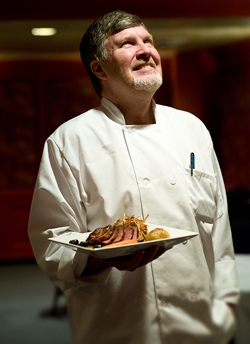 Counterpart to Central Market is the seasonally operated Eastern Market, a community initiative of The East King Improvement District. Interim market manager Fern Gilkerson explained that this region of the city has been economically unstable; Eastern sought to bring fresh, organic food to people who had not formerly had access, as well as providing a place for people to build a business.
Counterpart to Central Market is the seasonally operated Eastern Market, a community initiative of The East King Improvement District. Interim market manager Fern Gilkerson explained that this region of the city has been economically unstable; Eastern sought to bring fresh, organic food to people who had not formerly had access, as well as providing a place for people to build a business.
Every Wednesday and Saturday, June through October, the outdoor market comes alive with vendors selling fresh produce, eggs, cheeses and prepared foods, to the tune of local musicians performing live. The market directors have already planned visits to all of their farmers, every one located within 10 miles of the city center. “We make a real effort to build strong connections with farmers and producers,” says Gilkerson. “Our relationships are what make the market unique.”
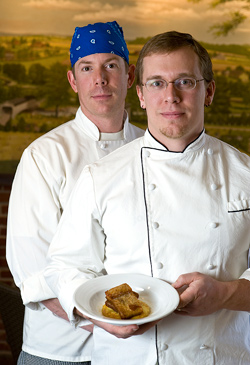 Tim Carr opened Carr’s Restaurant catty-corner to the Central Market more than eight years ago. A native Lancastrian, he learned to value locally raised ingredients during his training at the Culinary Institute of America, which takes advantage of the rich bounty of the surrounding Hudson River Valley. “We use as much local stuff as we can,” he says, gesturing towards the Elysian Farms lamb in his stall at the Central Market. “We’re lucky here–you can often find the words ‘Lancaster County’ on menus up and down the East Coast.”
Tim Carr opened Carr’s Restaurant catty-corner to the Central Market more than eight years ago. A native Lancastrian, he learned to value locally raised ingredients during his training at the Culinary Institute of America, which takes advantage of the rich bounty of the surrounding Hudson River Valley. “We use as much local stuff as we can,” he says, gesturing towards the Elysian Farms lamb in his stall at the Central Market. “We’re lucky here–you can often find the words ‘Lancaster County’ on menus up and down the East Coast.”
He notes that hometown restaurants are only recently utilizing the superior local ingredients. “For example, we started using these amazing local Eberly chickens when we opened the restaurant. Even though they are right here, we were the only restaurant in Lancaster County to use them,” he says. “The rest were all bought up by D’Artagnan and sold to big-name restaurants in New York and Philadelphia.”
Keeping a share of the harvest at home is the John J. Jeffries restaurant in the Lancaster Arts Hotel, once a 19th-century tobacco warehouse. The all-organic restaurant sources 89 percent of its ingredients from local farmers and livestock growers, even in the dark depths of February. Co-chefs and owners Michael Carson and Sean Cavanaugh believe that not only does local, chemical-free food taste better, but that this field-to-table way of eating can create a sustainable Lancaster and develop the local food-based economy.
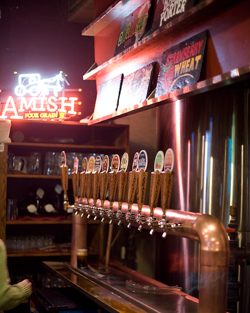 Though the philosophy is homegrown, the effect–in both the food and atmosphere–is quite refined and modern. When questioned on their favorite spot to have a drink, many city residents mentioned the cocktails spiked with fresh-squeezed juice and organic sodas served at the narrow horseshoe bar. Though now you can get a classic cocktail made with progressive ingredients alongside your Tamworth pork confit, many locals prefer to settle in to a seat at one of Lancaster’s brewpubs.
Though the philosophy is homegrown, the effect–in both the food and atmosphere–is quite refined and modern. When questioned on their favorite spot to have a drink, many city residents mentioned the cocktails spiked with fresh-squeezed juice and organic sodas served at the narrow horseshoe bar. Though now you can get a classic cocktail made with progressive ingredients alongside your Tamworth pork confit, many locals prefer to settle in to a seat at one of Lancaster’s brewpubs.
The Lancaster Malt Brewing Co. opened in 1995 serving pub food and beer crafted on-site. They changed their name to Lancaster Brewing Company in 2002, but continued to create brews in German, British and Belgian styles in small, unpasteurized batches. Their definitive Milk Stout, packaged in kegs and cases, is served on nitro draft in the restaurant and shipped all over the East Coast. LBC, with one location in Lancaster and one in Harrisburg, has recently gotten some competition from Iron Hill Brewery, which opened their seventh location across the street from Franklin & Marshall College in September. Iron Hill brewer Paul Rutherford takes the long view of the competing pubs, saying, “There are lots of beer drinkers in Lancaster. People here are very beer knowledgeable, and open to experimental stuff. Beer drinkers will go to any pub where the beer is good.”
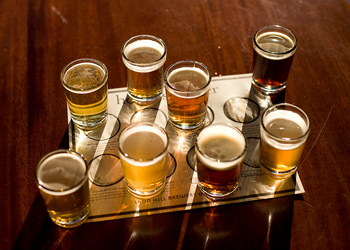 Good micro-brewed beer, pastured meats, local organic produce, chefs who are committed to sustaining the local economy through agriculture and a thriving community that moves from field to market to table–Lancaster now has all of the requirements to be considered a true dining destination. Some critics will scoff. Where are the foams, multi-course tasting menus and cavernous wine cellars? One bite of Rafiki’s pink bean salad or Tim Carr’s milk-fed, cage-free calves’ liver should remind food elitists of the fundamentals. The best ingredients, prepared with knowledge and respect, last through recessions when the wine cellars only gather dust and the nouveau foams are long deflated.
Good micro-brewed beer, pastured meats, local organic produce, chefs who are committed to sustaining the local economy through agriculture and a thriving community that moves from field to market to table–Lancaster now has all of the requirements to be considered a true dining destination. Some critics will scoff. Where are the foams, multi-course tasting menus and cavernous wine cellars? One bite of Rafiki’s pink bean salad or Tim Carr’s milk-fed, cage-free calves’ liver should remind food elitists of the fundamentals. The best ingredients, prepared with knowledge and respect, last through recessions when the wine cellars only gather dust and the nouveau foams are long deflated.
Central Market, 23 North Market St., 717-735-6890, Open Tuesdays, Fridays and Saturdays year-round.
Eastern Market, 308 East King St., 717-358-9368, Open Wednesdays and Saturdays, June through October.
Carr’s Restaurant, 50 West Grant St., 717-299-7090
John J. Jeffries Restaurant in the Lancaster Arts Hotel, 300 Harrisburg Ave., 717-431-3307.
Lancaster Brewing Co., 302 North Plum St., 717-391-6258.
Iron Hill Brewery, 781 Harrisburg Pike, 717-291-9800.
Felicia D’Ambrosio is co-editor of Philadelphia City Paper’s new food and drink blog, Meal Ticket.She can be seen about town cycling through traffic at breakneck speed,holding forth at the finest, cheapest gin mills, and consuming as muchraw fish as a small killer whale. Send feedback here.
To receive Keystone Edge free every week, click here.
Photos:
Country Meadow Grass Fed Meats (Usdin)
Market Vegetables (Usdin)
Tim Carr, Carr’s Restaurant (Usdin)
Michael Carson and Sean Cavanaugh at John J. Jefferies (Usdin)
Lancaster Malt Brewing Company (Persico)
Iron Hill Brewery (Persico)
Photographs by Glenn Usdin and Michael Persico
